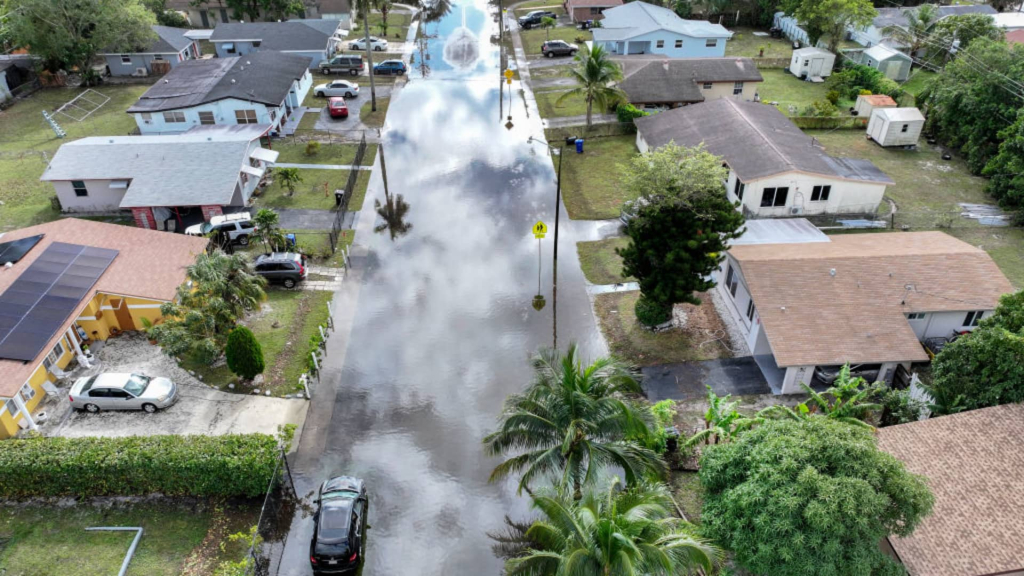When applying for a mortgage, prospective buyers are typically aware of the deep financial scrutiny imposed by lenders to evaluate creditworthiness. However, a new factor emerging in this process is climate change.
As the frequency and costs associated with climate disasters escalate, lenders are increasingly concerned about the financial implications of these events. Insurers are also grappling with the changing landscape, retreating from high-risk areas and thus exacerbating potential losses. Compounding these challenges are shifts within the Federal Emergency Management Agency (FEMA), notably under the previous administration, leading to workforce reductions and wavering disaster funding.
According to a recent report from First Street, a firm specializing in climate risk assessments, climate considerations are becoming integral to evaluating credit risk, alongside traditional metrics such as debt, income, and home collateral. Key risks encompass flooding, wildfires, and high winds.
The report projects that this year could see climate-driven foreclosures lead to approximately $1.21 billion in banking losses, accounting for 6.7% of total foreclosure credit losses. As severe weather patterns become more common and destructive, such losses could balloon to $5.36 billion within a decade, representing close to 30% of all foreclosure losses.
If lending institutions begin to incorporate climate risks into their credit evaluations, a borrower’s credit score may fluctuate based on the perceived risks to their property, potentially resulting in higher interest rates for borrowers in vulnerable areas. Currently, the majority of lender losses are concentrated in states like California, Florida, and Louisiana.
“Mortgage markets are now encountering the immediate impacts of climate risk,” remarked Jeremy Porter, head of climate implications at First Street. “Our findings reveal that physical hazards are already undermining the foundational assumptions of loan underwriting, property valuation, and credit servicing, creating systemic financial risks.”
Properties that suffer flooding during extreme weather are statistically at a greater risk of foreclosure compared to neighboring homes that remain unscathed. Historically, this translates to an astonishing 40% increase in foreclosure rates for homes that have been damaged by flooding, as indicated in the report.
Homeowners in high-risk locales, such as the coasts of Florida, are already witnessing significant increases in insurance premiums due to recent storm activity, a trend linked to a rise in foreclosure rates. In some cases, homeowners find themselves unable to accommodate the rising costs and opt to abandon their properties, thereby placing more financial burden on lenders.
While some lenders may mandate flood insurance for properties situated in designated flood zones, the broader lending community has not yet integrated the projections of future climate impacts into their underwriting processes. Fannie Mae, which plays a substantial role in funding the mortgage industry, had contemplated making such adjustments two years ago, but has yet to take definitive action.
According to the First Street report, the annual expenses linked to climate-induced disasters have surged by 1,580% over the past 40 years, drawing from data provided by the National Oceanic and Atmospheric Administration’s billion-dollar weather and climate disaster database, which will no longer receive updates due to reductions in staff by the previous administration.
This substantial cost rise stems not only from increasing severity of storms but also from inflation and population growth, coupled with extensive real estate development in vulnerable areas. While Americans are drawn to coastal living, the financial implications of residing in these at-risk regions are becoming increasingly significant.
Ultimately, the escalating costs associated with climate change and the corresponding financial risks are impacting individuals, financial institutions, and investment portfolios alike.
“A considerable amount of credit loss risk associated with climate change remains obscured within traditional credit loss models. This report outlines the systemic effects of weather disasters on the mortgage market, including both direct damages and indirect consequences, such as soaring insurance costs,” Porter concluded.


























